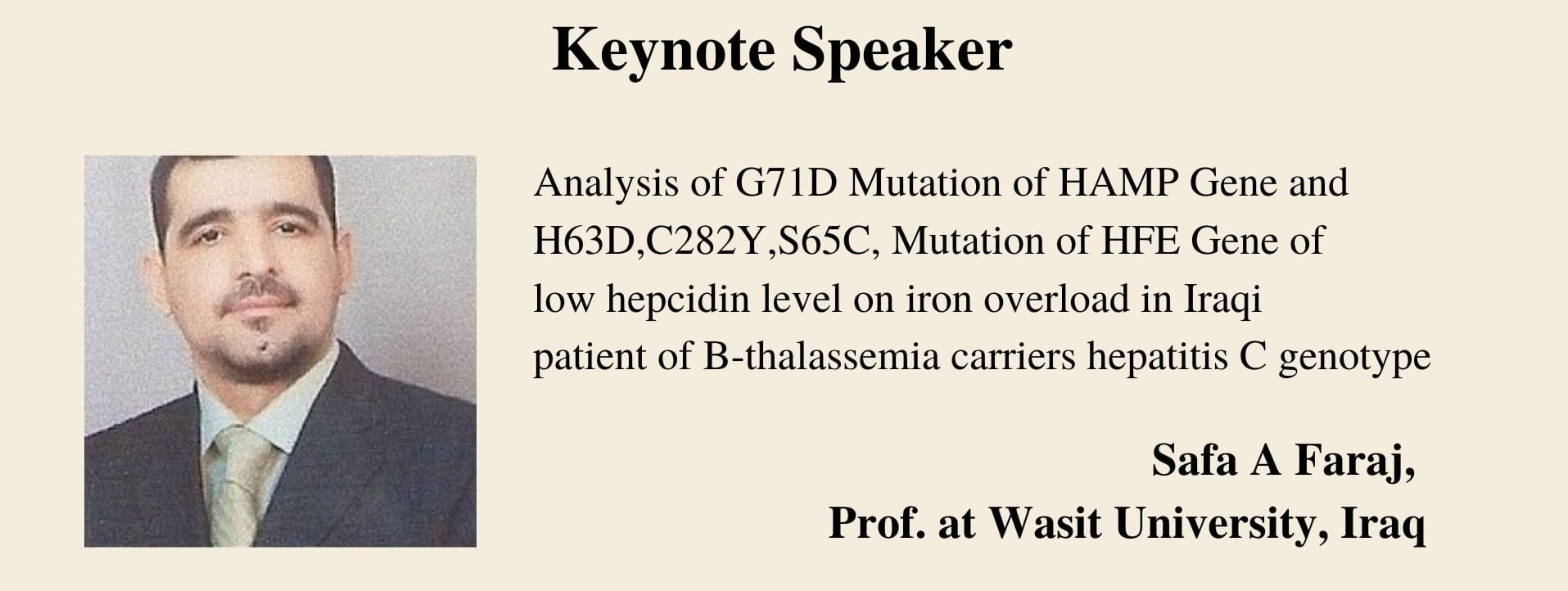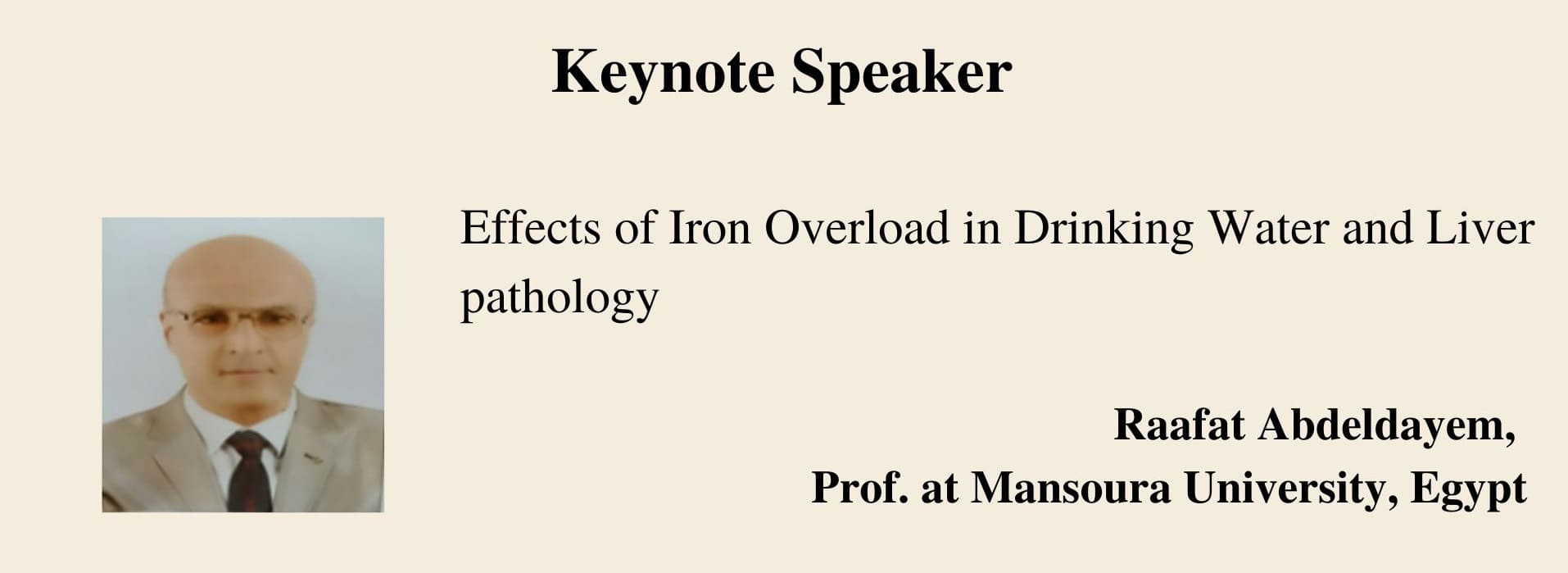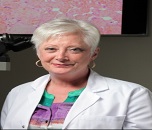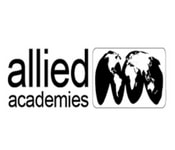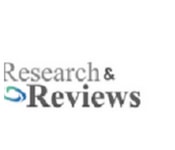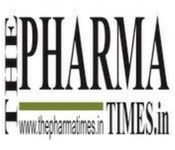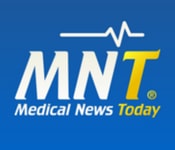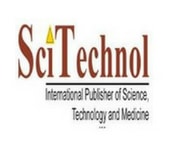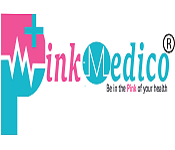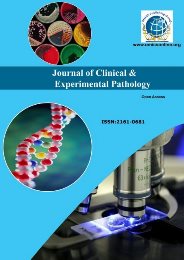Pathology Meetings 2020
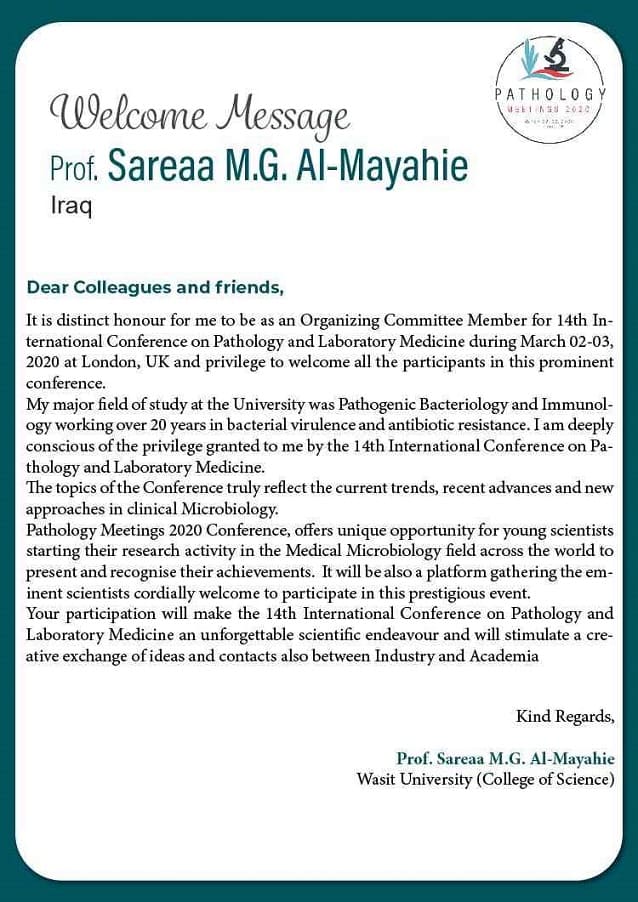
Conference Series LLC LTD welcomes all the experts across the globe to its 14th International Conference on "Pathology and Laboratory Medicine" (Pathology Meetings - 2020), to be held on March 02-03, 2020 in London, U.K. This conference comprises of brief keynote presentations, Oral talks, Poster presentations, Video Presentations, E-Poster Presentations, Workshops, and Exhibitions.
In light of this topic, conference series offers a platform to the experts across the globe in the area of pathology, pharmacy, clinical science, diagnostics, on-going research and Laboratory Medicine to share the cutting edge research discoveries and research.
“Exceed the limits of your imagination and accelerate your enthusiasm! "
Brochure Download | Announcements | Scientific Program | Conference Guide | Sponsorship Management | Abstract Submission | Registration Details | Organizing Committee
OUR VISION
Our aim is to bring the greatest minds together and interconnect the people across the globe. We provide a platform where exchange of ideas can take place and allow the researchers to think in different dimensions to help them in getting innovative ideas.
Brochure Download | Announcements | Scientific Program | Conference Guide | Sponsorship Management | Abstract Submission | Registration Details | Organizing Committee
ABOUT
Laboratory medicine is that the branch of medications amid which examples of tissue, liquid or diverse matter inspected outside of the individual, for the most part inside the lab.
Pathology is the study of disease in general, incorporating a wide range of biological science research departments and medical fields which is to describe work within the contemporary medical arena of "general pathology," which includes the diagnose of any particular disease—generally through analysis of tissue, cell, and body fluid samples. The medico practicing pathology is called a pathologist.
Brochure Download | Announcements | Scientific Program | Conference Guide | Sponsorship Management | Abstract Submission | Registration Details | Organizing Committee
WHY to attend this conference?
A- Acquire the broad set of perspectives and insights on some of the critical issues in the field of Lab medics and Pathology.
T- Transmit current issues and advances of your latest research.
T- Thought provoking speeches by Doctors, Professors, Ph.D.'s and Young Researchers.
E- Exhibit your Laboratory medics/devices, Surgical, Diagnostic Devices, and Services.
N- Network development with Academic and Business Professionals.
D- Developing highly effective techniques for diagnosis by sharing knowledge.
- Best platform to develop new partnership & collaborations
- Best chance to meet top speakers from all across the globe
- Best location to speed up your route into every territory in the World
- 89% our conference attendees are the Key contact in their labs purchasing decisions
- Our exhibitor booths were visited 4-5 times by 80% of the attendees during the conference
- Past exhibitor’s feedback reveals ample of enquiries perceived from the conference attendees
- Network development with both Academia and Business
- Platform to share knowledge and exchange of ideas
- Get thrilling experiences in London
- Best hospotality services
- Innovate and Evolve
Brochure Download | Announcements | Scientific Program | Conference Guide | Sponsorship Management | Abstract Submission | Registration Details | Organizing Committee
WHO Should Attend?
Practicing laboratory meds & pathologist, laboratory meds, Researchers, Scientists, Professors, Assistant Professors, Associate Professors, Students & pathologist in training and other healthcare professionals interested in the latest advances and technicians in the field. Another segment of the target audience is Pharmaceutical researchers, Clinical organizations, Educational institutes. Lab management, Anatomical Pathologists, Surgical Pathologists, Forensic Pathologists etc.
The 14th International Conference on Laboratory Medicine & Pathology Practice will exhibit the products and services from commercial and non-commercial organizations like Pathology Lab Equipment manufacturers, Cell Diagnostics Laboratories, Clinical Trial Sites, Business delegates, lab equipment and Equipment Manufacturers.
Brochure Download | Announcements | Scientific Program | Conference Guide | Sponsorship Management | Abstract Submission | Registration Details | Organizing Committee
Conference series LLC welcomes all the experts across the globe to its "14th International Conference on Pathology and Laboratory Medicine” (Pathology Meetings - 2020), to be held during March 02-03, 2020 in London, UK. This conference comprises of brief keynote presentations, Oral talks, Poster presentations, and Exhibitions.
In the light of this topic, conference series offers a platform for the experts across the globe in the area of pathology, pharmacy, clinical science and Laboratory Medicine to share the cutting edge research discoveries and research.
The revenue, spending, and test volume of the U.S. clinical laboratory testing market has grown steadily over the past decade. Clinical laboratory testing is positioned to directly benefit from the explosion in biotechnology, especially genomics. A range of dynamic trends is pushing market growth and company valuations. The global laboratory medicine analysers market was estimated at $8,965 million in 2014. This market is expected to grow at a CAGR of 5.52% between 2014 and 2019, to reach $11,728.01 million in 2019
Laboratory medicines are considered a vital part of the healthcare industry as almost 80.0% of doctor’s diagnoses are dependent on laboratory tests results. Laboratory diagnosis services, interpret and deliver specific information to doctors at the right time are perceiving an increase in demand. Laboratory medicine services offer a range of tests that help in identifying abnormalities and disease progression; these include routine urine and blood tests for genetic analysis like molecular expression testing, fluorescence in-situ hybridization. Major drivers for laboratory medicine market include increasing occurrence rates of chronic diseases, evolving the global base of geriatric population and increasing patient awareness levels affecting to disease diagnoses. Early disease detection assisted by specialized diagnosis, mostly in the areas of gynecology, endocrinology, and oncology is leading to doctors taking complete advantage of laboratory medicines for disease diagnosis and treatment. Global laboratory medicine market was valued at USD 174.14 billion in 2013. The market size of the Laboratory Medicine is highest in the USA, which is need to be get propagated across the globe in order to develop the world in this arena.
Demographic representation (%)
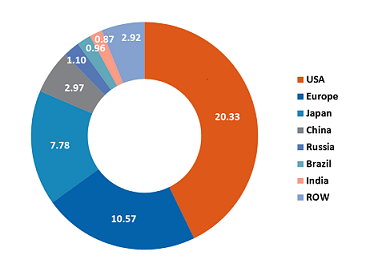
Market Value ($m)
Pathology specimens on an average currently number approximately 73,000 per year and autopsies number approximately 120 per year. Approximately 600 specimens are processed for electron microscopy annually including over 350 renal biopsies per year. The Pathology Advanced Diagnostics Laboratory performs over approximately Urovysion tests, KRAS tests, B and T gene rearrangements HPV genotypes, DNA ploidy studies, and small-round-blue-cell PCR panels annually. The global digital pathology market is estimated to reach $5.7 billion by 2020. The In vitro diagnostics market revenue is expected to reach $74.65 billion by 2020 at a CAGR of 5.34% during 2014-2020. The diagnostic Medicine market growth rate is 5-7% yearly. The market value of the Laboratory Medicine is increasing gradually. And it is likely to increase to 17227million $ till 2018. This is a huge leap from 2014 -2018; the market value is subsequently increasing, as it is shown below in a graphical representation.
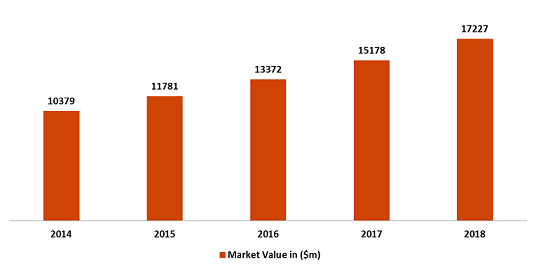
Future Market Growth ($bn)
As we can see the market value of Laboratory Medicine & Pathology is increasing so as the market value of the arena. In 2010 it was 57billion $, and due to the subsequent rise, it is expected to be 145 billion$ till 2023. We can see this graphical representation in the below-mentioned graph. As well as we can draw the conclusion that the arena is getting flourished at a fast pace.
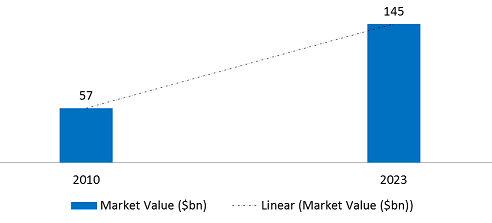
1) Anatomical and Molecular pathology
Anatomical pathology is a medical specialty related with the diagnosis of disease based on the macroscopic, microscopic, biochemical, immunologic and molecular examination of organs and tissues.
Two mail subdivisions in anatomical pathology are:
Histopathology refers to the microscopic examination of tissue in order to study the manifestations of the disease. Specifically, in clinical medicine, histopathology refers to the examination of a biopsy or surgical specimen by a pathologist, after the specimen has been processed and histological sections have been placed onto glass slides.
Cytopathology examines free cells or tissue micro-fragments (as "cell blocks"), single cells or small groups of cells from scrapings or aspiration of fluid or tissue under the microscope from various body sites to determine the cause or the nature of disease.
Molecular pathology is an evolving branch within pathology which is concentrated in the study and analysis of disease through the investigation of molecules within organs, tissues or bodily fluids. Molecular pathology shares some characteristics of practice with anatomic pathology as well as clinical pathology, molecular biology, biochemistry, proteomics, and genetics, and is sometimes considered as a "crossover" branch. It is multi-disciplinary in nature and focuses chiefly on the sub-microscopic characteristics of the disease. A key consideration is that more precise diagnosis is possible when the diagnosis is based on both the morphologic variations in tissues (traditional anatomic pathology) and on molecular testing.
Brochure Download | Announcements | Scientific Program | Conference Guide | Sponsorship Management | Abstract Submission | Registration Details | Organizing Committee
Digital pathology is a dynamic, image-based information environment that enables the acquisition, management, sharing and interpretation of pathology information — including slides and data — in a digital environment. Digital slides are created when glass slides are captured with a scanning device, to provide a high-resolution image that can be viewed on a computer screen or mobile device.
Brochure Download | Announcements | Scientific Program | Conference Guide | Sponsorship Management | Abstract Submission | Registration Details | Organizing Committee
3) Clinical and Hemato Pathology
Clinical pathology also termed as Clinical analysis or Clinical or Medical Biology. It is a medical domain that is associated with the analysis of disease centred on the laboratory analysis of bodily fluids, such as urine, blood and tissue homogenates or extracts using the tools of chemistry, hematology, microbiology and molecular pathology. Clinical pathology offers biochemical analysis of blood and urine for the determination of electrolyte status, diabetic control, markers of tissue destruction, and a host of other constituents in serum and plasma that specify a patient's degree of health or disease.
Hematopathology or hemopathology is the division of medicine related to the study, diagnosis, treatment, and prevention of diseases associated with the cells making up our blood. Diagnoses and treatment of diseases such as leukemia and lymphoma often deal with hematopathology.
Brochure Download | Announcements | Scientific Program | Conference Guide | Sponsorship Management | Abstract Submission | Registration Details | Organizing Committee
4) Dermato and Surgical Pathology
Dermatopathology involves the diagnosis of disorders of the skin. It is a joint subspecialty of both dermatology (the diagnosis and treatment of skin, hair and nail diseases) and pathology (identification of diseases microscopically) that focuses on the study of cutaneous diseases at a microscopic and molecular level.
Brochure Download | Announcements | Scientific Program | Conference Guide | Sponsorship Management | Abstract Submission | Registration Details | Organizing Committee
Pulmonary Pathology includes evaluation of specimens for neoplastic and non-neoplastic lung diseases with specialized expertise in neoplastic lung disease, occupational lung disease, and transplantation pathology.
Brochure Download | Announcements | Scientific Program | Conference Guide | Sponsorship Management | Abstract Submission | Registration Details | Organizing Committee
6) Phyto Pathology and Veterinary Pathology
Phytopathology also known as Plant Pathology includes the study of plant diseases, their causes and mechanisms by which diseases occur, disease-causing agents, and how to control diseases. These diseases are caused by living organisms such as fungi, bacteria, viruses, protozoa, and parasitic plants; and also by non-living agents, such as air pollutants and various environmental factors. ​This is an interdisciplinary science field that includes knowledge of botany, microbiology, ecology, genetics, biochemistry, molecular bio​logy, crop science, soil science, and physiology.
​Veterinary Pathology is the branch in science where study of animal diseases takes place. Veterinary pathologists are doctors of veterinary medicine who specialize in the diagnosis of diseases through the examination of animal tissue and body fluids.
Brochure Download | Announcements | Scientific Program | Conference Guide | Sponsorship Management | Abstract Submission | Registration Details | Organizing Committee
Neuropathology is the study of diseases of the nervous system which includes : Brain, Spinal cord, Body's extensive nerve network. It is closely related with the clinical disciplines of neurology, and neurosurgery, which often depend on neuropathology for a diagnosis. Neuropathology is different from neuropathy, which refers to disorders of the nerves themselves.
Brochure Download | Announcements | Scientific Program | Conference Guide | Sponsorship Management | Abstract Submission | Registration Details | Organizing Committee
Immunopathology is a branch of medicine that deals with immune responses and its diseases. It includes the study of the pathology of an organism, organ system, or disease with respect to the immune system, and immune responses.
Brochure Download | Announcements | Scientific Program | Conference Guide | Sponsorship Management | Abstract Submission | Registration Details | Organizing Committee
9) Oral and Maxillofacial Pathology
These pathology specialists study and research the causes, processes and effects of diseases that start in the mouth or jaw. Oral pathologists diagnose cases, using clinical, radiographic, microscopic, biochemical or other examinations, and do biopsies in consultation to dentists and other physicians providing patient care rather than providing direct patient care.
Brochure Download | Announcements | Scientific Program | Conference Guide | Sponsorship Management | Abstract Submission | Registration Details | Organizing Committee
10) Gastrointestinal Pathology
Gastrointestinal Pathology generally relates to the diseases in digestive tracts. The main purpose of the gastrointestinal tract is the transport of food and the absorption of nutrients. Many pathologic conditions of the gastrointestinal tract impair either or both of these functions.
Brochure Download | Announcements | Scientific Program | Conference Guide | Sponsorship Management | Abstract Submission | Registration Details | Organizing Committee
Ophthalmic Pathology is associated with the diseases of the eye and its neighbouring tissues. The diagnosis of the disease plays an important part in patient care. The examination of the diseased tissue is done macroscopically and by light microscopy. Other techniques include immunohistochemistry, molecular testing, and electron microscopy in the detection and treatment of the diseases related to eyes.
Brochure Download | Announcements | Scientific Program | Conference Guide | Sponsorship Management | Abstract Submission | Registration Details | Organizing Committee
12) Renal and Gynaecological Pathology
Renal pathology is a subspecialty of anatomic pathology that deals with the comprehensive consultative expertise and services relating to disorders of the kidneys, including diagnosis and characterization of native and transplant renal biopsies (for both adults and children).
Gynaecologic pathology is the subspecialty of pathology managing the analysis and study of infection including the female genital tract. It provides accurate and timely consultation of diagnostic and therapeutic biopsies. Specimens include the vulva, vagina, cervix, uterus, metastatic nodal disease, and fallopian tubes and ovaries. The term Gynecologic derived from Greek gyno-(gynaikos) signifying "lady" and the ology signifying "investigation of". Gynaecological pathology deals with cervical cancer, ovarian cancer, uterine cancer, papillomavirus infection and trophoblastic tumors. Gynecologic Pathology lays out timely nd accurate consultation of therapeutic and diagnostic biopsies.
Brochure Download | Announcements | Scientific Program | Conference Guide | Sponsorship Management | Abstract Submission | Registration Details | Organizing Committee
13) Advancements in Cancer and Chemotherapy
Cancer Biology, it is a field to understand how cancer develops and progresses, the researcher’s first need to investigate the biological differences between normal cells and cancer cells. This work focuses on the mechanisms that underlie fundamental processes such as cell growth, the transformation of normal cells to cancer cells, and the spread, or metastasis, of cancer cells.
Knowledge gained from such studies deepens our understanding of cancer and produces insights that could lead to the development of new clinical interventions. For example, studies of cell signalling pathways in normal cells and cancer cells have contributed greatly to our knowledge about the disease, revealing molecular alterations that are shared among different types of cancer and pointing to possible strategies for treatment.
Advanced Chemotherapy (often abbreviated to chemo and sometimes CTX or CTx) is a type of Advancements made in cancer treatment that uses one or more anti-cancer drugs (chemotherapeutic agents) as part of a standardized chemotherapy regimen. Chemotherapy may be given with a curative intent (which almost always involves combinations of drugs), or it may aim to prolong life or to reduce symptoms (palliative chemotherapy). Chemotherapy is one of the major categories of the medical discipline specifically devoted to pharmacotherapy for cancer, which is called medical oncology.
Brochure Download | Announcements | Scientific Program | Conference Guide | Sponsorship Management | Abstract Submission | Registration Details | Organizing Committee
14) Advanced Diagnostics Technology in Pathology & Laboratory Medicine
A diagnosis, in the sense of diagnostic technique, can be regarded as an attempt at classification of an individual's disorder into isolated and distinct categories that allow medical decisions about cure and prognosis to be made.
Advanced Diagnostic Technology is the advancements made in the field of Diagnostic Technology, Medicine/Medical a device or substance used for the analysis or detection of diseases or other medical conditions. A message output by a computer diagnosing an error in a computer program, computer system, or component device, Advancements in Diagnostic Services facilitates the provision of timely, cost-effective, and high-quality diagnostic care in safe and secure environments. It includes the clinical services of Pathology and Laboratory Medicine, Radiology, and Nuclear Medicine.
Brochure Download | Announcements | Scientific Program | Conference Guide | Sponsorship Management | Abstract Submission | Registration Details | Organizing Committee
15) Forensic in Pathology and Laboratory Medicine
Forensic science is the application of science to criminal and civil laws, mainly—on the criminal side—during the criminal investigation, as governed by the legal standards of admissible evidence and criminal procedure.
Brochure Download | Announcements | Scientific Program | Conference Guide | Sponsorship Management | Abstract Submission | Registration Details | Organizing Committee
16) Pediatrics in Pathology and Laboratory Medicine
The practice of Pediatric comprises unique challenges related to expansion, nourishment, development, and diseases throughout different periods of infancy, childhood, and adolescence.
Pediatrics laboratory medicine, is the division of medicine that deals with the medical treatment of infants, children, and adolescents, and the age limit usually varies from birth up to 18 years of age The Pediatric laboratory medicine comprises of clinical laboratory scientists, clinical pathologists, and clinicians, including point-of-care testing, analytic factors, age-specific reference intervals, pre-analytic variables, esoteric laboratory examinations and clinical impact. Although stimulating, Pediatric laboratory testing offers many opportunities for enhanced patient care, clinical- and laboratory-based investigation, and education.
Brochure Download | Announcements | Scientific Program | Conference Guide | Sponsorship Management | Abstract Submission | Registration Details | Organizing Committee
17) Clinics in Laboratory Medicine
Clinics in Laboratory Medicine update those whose research work is in the field of clinical pathology on the latest trends in clinical laboratory management. It provides a sound basis for creating and working in a highly effective clinical laboratory.
Brochure Download | Announcements | Scientific Program | Conference Guide | Sponsorship Management | Abstract Submission | Registration Details | Organizing Committee
18) Therapeutics
This word is originated from the Greek word "therapeia" meaning "a service, an attendance" and “therapeutikos” meaning “inclined to serve.”
Therapeutics in a broad sense is the treatment used for combating a particular disease and serving, taking care of a patient in a comprehensive manner for the same purpose and managing specific problems. In medicine it is a branch dealing specifically with the treatment of disease and the art and science of healing.
Brochure Download | Announcements | Scientific Program | Conference Guide | Sponsorship Management | Abstract Submission | Registration Details | Organizing Committee
19) Antibiotics in Laboratory Medicine
Antibiotics in Laboratory Medicine have been the defining orientation source for estimating the effectiveness of antibiotic compounds in treating infectious ailments for over 35 years. Antibiotics, also known as antibacterial, are a kind of antimicrobial drug used in the cure and inhibition of bacterial toxicities. They may either kill or hinder the advancement of bacteria. Antibiotics are used to treat or prevent bacterial contaminations, and sometimes protozoan contaminations. Like Metronidazole is effective against a numerous parasitic diseases.
Brochure Download | Announcements | Scientific Program | Conference Guide | Sponsorship Management | Abstract Submission | Registration Details | Organizing Committee
20) AI & Robotics in Lab Medicine
AI & Robotics in Lab medicine are rapid changes in healthcare coupled with parallel advances in technology have stimulated the evolution of new approaches for laboratory automation. In particular, the emergence of commercially available laboratory robotic systems and Artificial Intelligence offers promise for streamlining the clinical laboratory. Increasing cost-containment pressures make the application of this technology extremely attractive, and several organizations have begun to systematically integrate robotic devices and artificial intelligence into their laboratory automation schemes. Integration of these technologies, however, presents many challenges for software developers, instrument manufacturers, and laboratory workers. Differing needs across laboratories require flexibility and intelligence in robots, instruments, and control systems. Standardization of mechanical and electronic interfaces will be the key role to making these systems easy to integrate. Systems engineering, aided by simulation modelling and artificial intelligence schemes, will be important to assist in the design of optimal configurations. Software for the overall control of integrated automation will be needed that can be tailored by the laboratory- Nan to fit the requirements of the individual laboratory. Thus, laboratory workers will need to be actively involved in implementing this new wave of laboratory automation, becoming well-versed in computers, electronics, and systems engineering.
Brochure Download | Announcements | Scientific Program | Conference Guide | Sponsorship Management | Abstract Submission | Registration Details | Organizing Committee
21) Advanced Nursing Practices
Advanced Nursing Practices, Advancements made in nursing practices within the health care sector focused on the care of individuals, families, and communities with a laboratory practitioner, so they may attain, maintain, or recover optimal health and advancement in the quality of patient life. Nurses may be differentiated from other health care providers by their approach to patient care, training, and scope of practice. Nurses practice in many specialties with differing levels of prescription authority. Many nurses provide care within the ordering scope of physicians, and this traditional role has shaped the public image of nurses as care providers. However, nurse practitioners are permitted by most jurisdictions to practice independently in a variety of settings. In the postwar period, nurse education has undergone a process of diversification towards advanced and specialized credentials, and many of the traditional regulations and provider roles are changing, emerging and advancing.
Brochure Download | Announcements | Scientific Program | Conference Guide | Sponsorship Management | Abstract Submission | Registration Details | Organizing Committee
22) Advanced Bioinformatics & Biostatistical Technology
Bioinformatics is an interdisciplinary field that develops methods and software tools for understanding biological data. As an interdisciplinary field of science, bioinformatics combines biology, computer science, mathematics and statistics to analyze and interpret biological data. Bioinformatics has been used for in silico analyses of biological queries using mathematical and statistical techniques.
Biostatistics is the application of statistics to a wide range of topics in biology. It encompasses the design of biological experiments, especially in medicine, pharmacy, agriculture and fishery; the collection, summarization, and analysis of data from those experiments; and the interpretation of, and inference from, the results. A major branch is a medical biostatistics, which is exclusively concerned with medicine and health.
Brochure Download | Announcements | Scientific Program | Conference Guide | Sponsorship Management | Abstract Submission | Registration Details | Organizing Committee
23) Laboratory Management & Lab Instrumentation
A Laboratory Management system is a software-based laboratory and information management system with features that support a modern laboratory's operations. Laboratory management is responsible for guaranteeing that the job descriptions meet the human resource strategies, laboratory regulations, and accreditations criterions.
Laboratory Instrumentation, Analytical lab instruments encompass a wide range of instrumentation whose principal purpose is to qualitatively and quantitatively analyze samples; the chemical makeup of a sample and the quantity of each component within a sample.
Brochure Download | Announcements | Scientific Program | Conference Guide | Sponsorship Management | Abstract Submission | Registration Details | Organizing Committee
24) Clinical Biochemistry & Biochemical Technology
Clinical chemistry (also known as chemical pathology, clinical biochemistry or medical biochemistry) is the area of chemistry that is generally concerned with the analysis of bodily fluids for diagnostic and therapeutic purposes. It is an applied form of biochemistry (not to be confused with medicinal chemistry, which involves basic research for drug development).
Biochemical Technology, sometimes called biological technology, is the study of chemical processes and technology within and relating to living organisms. Biochemical processes give rise to the complexity of life. Biochemistry can be divided in three fields; molecular genetics, protein science and metabolism. Almost all areas of the life sciences, like botany, medicine, and genetics are being uncovered and developed by biochemical methodology, technology and research. Biochemistry focuses on understanding how biological molecules give rise to the processes that occur within living cells and between cells, which in turn relates greatly to the study and understanding of tissues, organs, and organism structure and function.
Brochure Download | Announcements | Scientific Program | Conference Guide | Sponsorship Management | Abstract Submission | Registration Details | Organizing Committee
25) Cheminformatics & Drug Designing
Cheminformatics (also known as chemoinformatics, chemioinformatics and chemical informatics) is the use of computer and informational techniques applied to a range of problems in the field of chemistry. These in silico techniques are used, for example, in pharmaceutical companies in the process of drug discovery. These methods can also be used in chemical and allied industries in various other forms.
Drug design, often referred to as rational drug design or simply rational design, is the inventive process of finding new medications based on the knowledge of a biological target. The drug is most commonly an organic small molecule that activates or inhibits the function of a biomolecule such as a protein, which in turn results in a therapeutic benefit to the patient. In the most basic sense, drug design involves the design of molecules that are complementary in shape and charge to the bimolecular target with which they interact and therefore will bind to it. Drug design frequently but not necessarily relies on computer modelling techniques. This type of modelling is sometimes referred to as computer-aided drug design. Finally, drug design that relies on the knowledge of the three-dimensional structure of the bimolecular target is known as structure-based drug design. In addition to small molecules, biopharmaceuticals and especially therapeutic antibodies are an increasingly important class of drugs and computational methods for improving the affinity, selectivity, and stability of these protein-based therapeutics have also been developed.
Brochure Download | Announcements | Scientific Program | Conference Guide | Sponsorship Management | Abstract Submission | Registration Details | Organizing Committee
26) Advanced Quantitative Techniques
Quantitative Techniques basic practical topic covers downstream processing techniques suitable for production-scale protein purification and illustrates how these techniques should be considered for process development. The focus of this session is on the understanding of the techniques and the parameters governing separation. Detailed presentations of the downstream processing techniques used (cross-flow filtration & chromatography) are included as well as content covering optimization and purification strategies. Scale-up issues, column maintenance, and process hygiene are briefly presented to describe the industrial environment and its principal objectives. Additionally, an overview of the analytical techniques used for product identification is presented.
Brochure Download | Announcements | Scientific Program | Conference Guide | Sponsorship Management | Abstract Submission | Registration Details | Organizing Committee
Laboratory Medicine 2018
We gratefully thank all our wonderful Keynote and Plenary Speakers, Conference Attendees, Students, Media Partners and Associations for making Laboratory Medicine & Pathology 2018 grand success.
The 13th International Conference on Laboratory Medicine & Pathology hosted by the Conference series was held during June 25 – 26, 2018 at Berlin, Germany based on the theme “Excavating laboratory medicine in the era of automation, digitization and informatics". Benevolent response and active participation were received from the Organizing Committee Members along with Scientists, Researchers, Students and leaders from the area of Laboratory Medicine and Pathology who made this event a grand success.
Conference series LLC LTD expresses its gratitude to the conference Moderator, namely Cynthia Lorenzo from Genoptix Medical Laboratory, USA taking up the responsibility to coordinate during the sessions. We are indebted to your support.
Conference series would like to convey warm gratitude to all the Honorable guests and Keynote Speakers of Laboratory Medicine 2018:
- Petr Starostik, University of Florida, USA
- Claudio Sorio, University of Verona, Italy
- Ian James Martins, Edith Cowan University, Australia
- Naglaa Kholoussi, National Research Centre, Egypt
Laboratory Medicine 2017
We gratefully thank all our wonderful Keynote and Plenary Speakers, Conference Attendees, Students, Media Partners and Associations for making Laboratory Medicine & Pathology 2017 grand success.
The 12th International Conference on Laboratory Medicine & Pathology hosted by the Conference series was held during March 15-16, 2017 at London, UK based on the theme “Propagating the revolutions in Laboratory Medicine & Pathology". Benevolent response and active participation were received from the Organizing Committee Members along with Scientists, Researchers, Students and leaders from the area of Laboratory Medicine and Pathology who made this event a grand success.
Conference series LLC LTD expresses its gratitude to the conference Moderator, namely Petr Starostik from University of Florida in Gainesville, FL, USA for taking up the responsibility to coordinate during the sessions. We are indebted to your support.
Conference series would like to convey warm gratitude to all the Honorable guests and Keynote Speakers of Laboratory Medicine 2017:
- Petr Starostik, University of Florida, USA
- Brian Bennett, Marquette University, USA
- Hong L Drum, Genoptix Medical Laboratory, USA
- Hiroyuki Shimada, University of Southern California, USA Children’s Hospital Los Angeles, USA
- Cynthia Lorenzo, Genoptix Medical Laboratory, USA
- Isme M de Kleer, Erasmus Medical Center, Netherlands
- Sarah Adelaide Crawford, Southern Connecticut State University, USA
- Mary Ann G Sanders, University of Louisville, USA
- Maria Amparo Lopez-Ruiz, CEU Cardenal Herrera University, Spain
- Michael Kalinin, Ben-Gurion University of the Negev, Israel
- Raja Alyusuf, Salmaniya Medical Complex, Ministry of Health, Bahrain
- Mir Anwar, Richmond Chest Hospital, South Africa
Conference Highlights
- Anatomical and Molecular pathology
- Digital Pathology
- Clinical and Hemato Pathology
- Dermato and Surgical Pathology
- Pulmonary Pathology
- Phyto Pathology and Veterinary Pathology
- Neuro Pathology
- Immunopathology
- Oral and Maxillofacial Pathology
- Gastrointestinal Pathology
- Ophthalmic Pathology
- Renal and Gynaecological Pathology
- Advancements in Cancer and Chemotherapy
- Advanced Diagnostics Technology in Pathology & Laboratory Medicine
- Forensic in Pathology and Laboratory Medicine
- Pediatrics in Pathology and Laboratory Medicine
- Clinics in Laboratory Medicine
- Therapeutics
- Antibiotics in Laboratory Medicine
- AI & Robotics in Lab Medicine
- Advanced Nursing Practices
- Advanced Bioinformatics & Biostatistical Technology
- Laboratory Management & Lab Instrumentation
- Clinical Biochemistry & Biochemical Technology
- Cheminformatics & Drug Designing
- Advanced Quantitative Techniques
To share your views and research, please click here to register for the Conference.
To Collaborate Scientific Professionals around the World
| Conference Date | March 02-03, 2020 | ||
| Sponsors & Exhibitors |
|
||
| Speaker Opportunity Closed | |||
| Poster Opportunity Closed | Click Here to View | ||
Useful Links
Special Issues
All accepted abstracts will be published in respective Our International Journals.
- Diagnostic Pathology
- Journal of Clinical and Experimental Pathology
- Journal of Molecular and Genetic Medicine
Abstracts will be provided with Digital Object Identifier by




